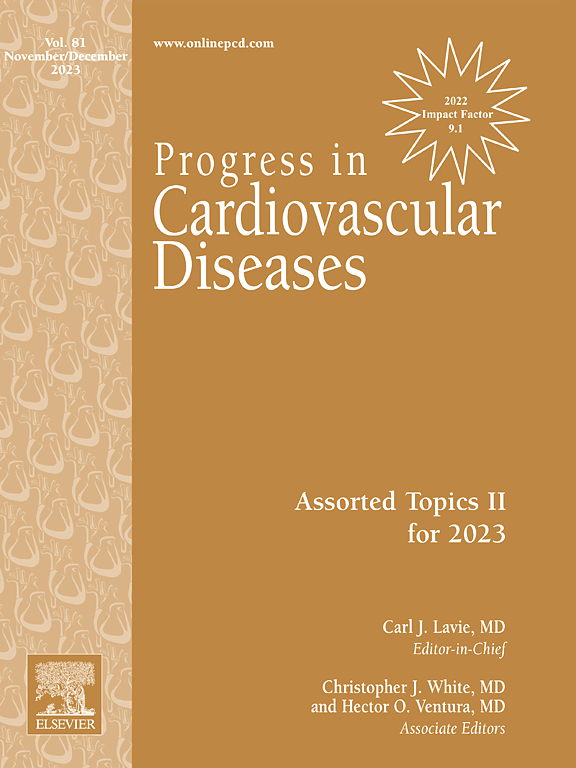回顾塔克苏波心肌病与肾上腺功能不全之间的相互作用:儿茶酚胺激增与糖皮质激素缺乏
IF 7.6
2区 医学
Q1 CARDIAC & CARDIOVASCULAR SYSTEMS
引用次数: 0
摘要
背景:塔克氏心肌病(Takotsubo Cardiomyopathy,TCM)是一种一过性心脏疾病,通常由应激诱发,以非典型心室气囊扩张为特征。中药与肾上腺功能不全(AI)之间的相互作用,尤其是儿茶酚胺过多和糖皮质激素缺乏对中药在 AI 患者中发病机制的影响,值得进行全面探讨,以更好地了解中药的病理生理学并制定潜在的治疗策略:我们通过 PubMed 和 Google Scholar 进行了广泛的文献检索,主要针对有关人工智能、心力衰竭和心肌病的报道,并辅以正向和反向引文追踪。我们分析了 45 篇报道中的 46 个病例,并根据 AI 分类评估了临床表现和预后:结果:在 AI 患者中,糖皮质激素的缺乏似乎加剧了心肌对儿茶酚胺毒性的脆弱性,从而诱发了中药。大多数情况是可逆的,但有三例 1990 年以前的病例导致了不可逆转的结果:对 AI 和中药交叉的调查强调了儿茶酚胺在糖皮质激素缺失时的致病意义。这些数据巩固了糖皮质激素缺乏会加剧心脏对儿茶酚胺能毒性的易感性,从而可能引发中医的假说。该研究肯定了糖皮质激素的心脏保护作用,并阐明了儿茶酚胺激增是如何导致中医发病的,建议对人工流产患者进行战略性临床管理调整,以降低中医发病率。本文章由计算机程序翻译,如有差异,请以英文原文为准。
A review of the interplay between Takotsubo cardiomyopathy and adrenal insufficiency: Catecholamine surge and glucocorticoid deficiency
Background
Takotsubo Cardiomyopathy (TCM) is a transient heart condition often precipitated by stress and characterized by atypical ventricular ballooning. The interplay between TCM and Adrenal Insufficiency (AI), particularly the influence of catecholamine excess and glucocorticoid deficiency on TCM's pathogenesis in individuals with AI, warrants comprehensive exploration for a better understanding of TCM pathophysiology and establishment of potential therapeutic strategies.
Methods
We conducted an extensive literature search via PubMed and Google Scholar, targeting reports on AI, heart failure, and cardiomyopathy, supplemented by forward and backward citation tracing. We analyzed 46 cases from 45 reports, assessing the clinical presentation and outcomes in the context of AI categorization.
Results
In patients with AI, a glucocorticoid deficit appears to exacerbate the myocardial vulnerability to catecholamine toxicity, precipitating TCM. Most conditions were reversible; however, three pre-1990 cases resulted in irreversible outcomes.
Conclusions
The investigation into the AI and TCM intersection highlights the pathogenic significance of catecholamines in the absence of glucocorticoids. The data consolidates the hypothesis that glucocorticoid scarcity exacerbates the cardiac susceptibility to catecholaminergic toxicity, potentially triggering TCM. The study affirms glucocorticoids' cardioprotective roles and elucidates how catecholamine surges contribute to TCM pathogenesis, suggesting strategic clinical management adjustments for AI patients to reduce TCM incidence.
求助全文
通过发布文献求助,成功后即可免费获取论文全文。
去求助
来源期刊

Progress in cardiovascular diseases
医学-心血管系统
CiteScore
10.90
自引率
6.60%
发文量
98
审稿时长
7 days
期刊介绍:
Progress in Cardiovascular Diseases provides comprehensive coverage of a single topic related to heart and circulatory disorders in each issue. Some issues include special articles, definitive reviews that capture the state of the art in the management of particular clinical problems in cardiology.
 求助内容:
求助内容: 应助结果提醒方式:
应助结果提醒方式:


